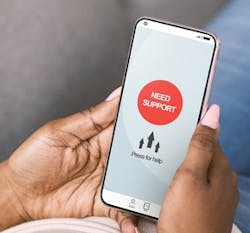This is a difficult question to answer and the topic still needs to be studied.
A study, reported in January 2020 by the University of Wisconsin, examined mobile app mental interventions used by 50,000 patients and did not find “convincing evidence” that this method of intervention greatly improved outcomes related to anxiety, depression, smoking or drinking, thoughts of suicide, or feelings of well-being.
While that doesn’t sound good, an article in the Harvard Business Review talks about the study staying: “While this sounds unfortunate, this may be related to the study methods in which researchers grouped interventions together that may be completely different.” And that article poses a question comparing an app to the value of a therapist. I would argue that often that’s not a practical comparison given the price and shortage of therapists.
However, The National Institute of Mental Health offers some pros and cons of mental health apps:
- Convenience: Treatment can take place anytime and anywhere (e.g., at home in the middle of the night or on a bus on the way to work) and may be ideal for those who have trouble with in-person appointments.
- Anonymity: Clients can seek treatment options without involving other people.
- An introduction to care: Technology may be a good first step for those who have avoided mental health care in the past.
- Lower cost: Some apps are free or cost less than traditional care.
- Service to more people: Technology can help mental health providers offer treatment to people in remote areas or to many people in times of sudden need (e.g., following a natural disaster or terror attack).
- Interest: Some technologies might be more appealing than traditional treatment methods, which may encourage clients to continue therapy.
- 24-hour service: Technology can provide round-the-clock monitoring or intervention support.
- Consistency: Technology can offer the same treatment program to all users.
- Support: Technology can complement traditional therapy by extending an in-person session, reinforcing new skills, and providing support and monitoring.
- Objective data collection: Technology can quantitatively collect information such as location, movement, phone use, and other information.
Some of the cons, or concerns include:
- Effectiveness: The biggest concern with technological interventions is obtaining scientific evidence that they work and that they work as well as traditional methods.
- For whom and for what: Another concern is understanding if apps work for all people and for all mental health conditions.
- Privacy: Apps deal with very sensitive personal information so app makers need to be able to guarantee privacy for app users.
- Guidance: There are no industry-wide standards to help consumers know if an app or other mobile technology is proven effective.
- Regulation: The question of who will or should regulate mental health technology and the data it generates needs to be answered.
- Overselling: There is some concern that if an app or program promises more than it delivers, consumers may turn away from other, more effective therapies.
About the Author
Adrienne Selko
Senior Editor
Email [email protected]
Adrienne Selko is also the senior editor at Material Handling and Logistics and is a former editor of IndustryWeek.

